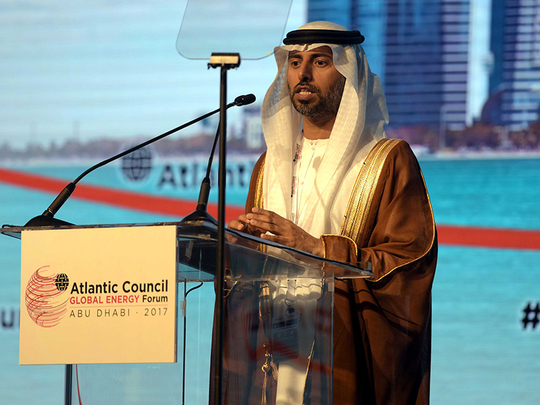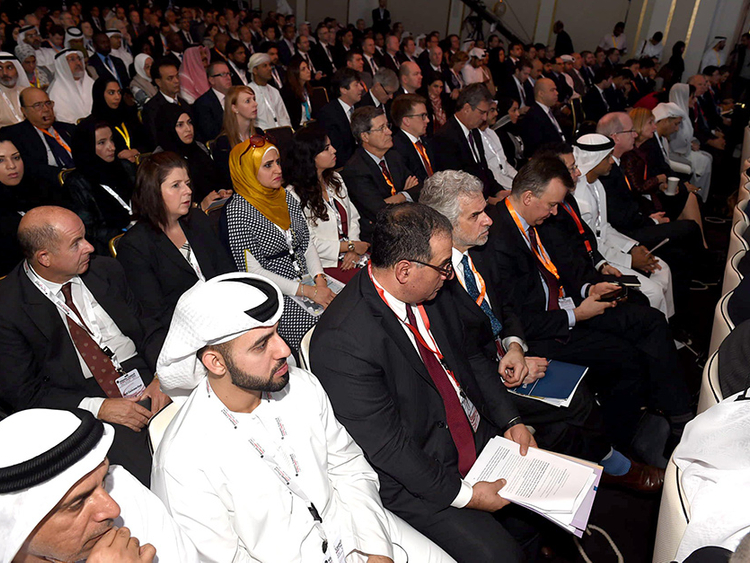
Abu Dhabi: The oil market should take around six months of cuts to rebound, according to Suhail Mohammad Faraj Al Mazroui, Minister of Energy.
“It will take around 6 months to at least reach equilibrium,” he told the Global Energy Forum in Abu Dhabi on Thursday. “But it is premature to judge whether the Opec deal is effective, and whether it will need to be extended beyond six months.”
Speaking about the UAE’s Energy Plan 2050 announced on Tuesday, which aims to reduce carbon dioxide emissions by 70 per cent, increase clean energy by 50 per cent and improve energy efficiency by 40 per cent, Al Mazroui stated that “we are trying to build a model, primarily for ourselves, but also for anyone else who wants it.”
The energy minister also stated that record global oil inventories would fall to a five-year average by mid-2017.
The Organisation of Petroleum Exporting Countries and 11 other producers including Russia agreed on December 10 to jointly cut output by about 1.8 million barrels a day in an effort to end a three-year oil surplus, which sent prices spiralling and battered the economies of producing nations around the world.
Energy ministers from Saudi Arabia, the UAE, Qatar, Iraq and Kuwait are participating in the two-day global energy forum, which began on Thursday.
Total CEO Patrick Pouyanne argued that the market remains fragile, telling those in attendance that Opec needed to sustain oil supply cuts for two years to rebalance and reduce “record inventories.”
The discussion quickly turned to Donald Trump, President-elect of the United States, with panelists questioning whether Trump would tax imported oil.
The businessman-turned-politician has campaigned on a platform of ‘America First’ and protectionism.
“We must assume above all else that Trump will put American jobs, industries and the economy first,” Pouyanne stated.
In line with the conference’s theme of ‘The Geopolitics of the Energy Transformation,’ the Total CEO shared his biggest political concern for 2017.
“The world is facing a lot of instability. Particularly in this region. In my life, I’ve never seen so many conflicts. We are all watching Trump closely, as what he does is very important,” Pouyanne stated.
“But I am fully against sanctions. I always have been,” he added, referring to the historical regime of sanctions against Iran, and more recently Russia. Total was the first Western country to return to Iran.
He added that Trump would find it difficult to maintain a relationship with Russian President Vladimir Putin if America nixed the Iran nuclear deal that was reached in July 2015.
Emphasis on renewables
The UAE announced on Tuesday that it would be investing $161 billion (Dh591 billion) over the next three decades into clean, renewable energy. A week or so earlier, China, the world’s largest energy market, stated that it would plough approximately $358 billion by 2020 into cleaner fuels. With a growing emphasis on companies and countries moving away from fossil fuels and non-renewable energy, it was always likely to feature prominantly at an energy conference.
Al Mazroui has been a vocal supporter of renewable energy. He told the conference that competition from solar power had driven down the cost of gas, but that the “problem remains intermittency”.
Mohammad Al Hammadi, CEO of the Emirates Nuclear Energy Corporation, stated that “the future of clean energy is bright in the UAE, and around the world.”
Adnan Z. Ameen, Director-General of the International Renewable Energy Agency, commented in response to Al Hammadi’s point that “in terms of fossil fuels versus renewables, it’s game over.”













